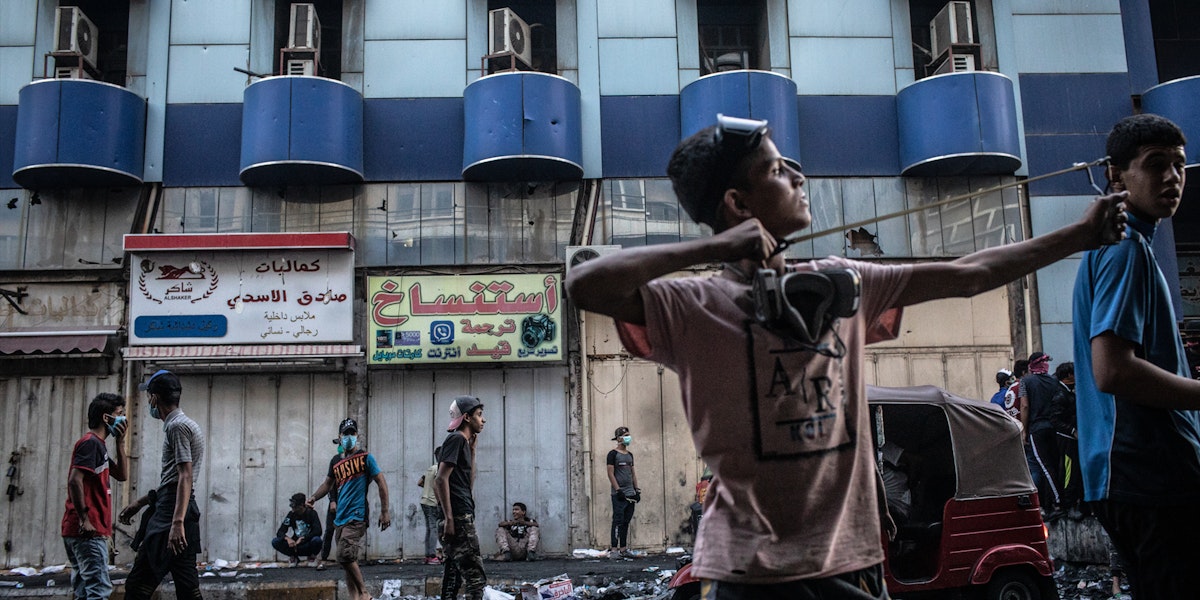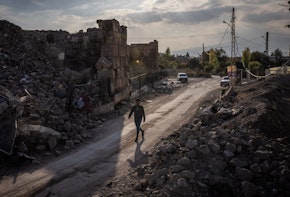New revolts have shaken authoritarian regimes in both Iraq and Lebanon to the core, because of their mass appeal, tactical innovation, legitimacy, and staying power. So far, and unsurprisingly, the rulers of Iraq and Lebanon have followed the classic authoritarian playbook. They have used or supported violence against peaceful demonstrators. They have blamed foreign plots, rather than their own failures in power. They have slow-rolled or actively resisted any proposed reforms. They believe that they can outwait the protests, and that even a short-term reprieve from accountability is worth any and all costs.
There is much to unpack in the current wave of protests, which began in Sudan and Algeria, and are now gripping Lebanon and Iraq as well. A shared regional identity and a common challenge course through these national protest movements, despite their distinct individual trajectories. Shared systemic grievances connect Iraq and Lebanon in particular. Their political economies are connected by geography, and by the shared experience of foreign powers that intervene in their politics. More pointedly, both countries labor under corrupt sectarian quota systems controlled by warlords who rule through similar power-sharing arrangements, which carve up patronage among all the warlords so that there is never an organized political opposition. Both countries are suffering from similar gangsterish moves by their ruling classes, which threaten civil war and overtly orchestrate violence in an effort to shut down the protests. Both systems of power have followed the same central blueprint: threaten to break the country, violently, rather than improve governance; and in both countries, populations weigh the risks seriously—none want another civil war—but have been driven to such desperation that they’re willing to seek improved livelihood even at the risk of individual death or civic collapse.
Lebanon and Iraq didn’t experience national revolts during the first wave of Arab uprisings that started in 2010—in part because the specter of civil war and large-scale violence was tangible enough to deter demonstrators, and in part because both countries have electoral systems that offer at least the prospect for nonviolent political change and reform. The very fact of the uprisings in Lebanon and Iraq testifies to epic failures of the governments in the two countries. Moreover, both countries have attracted long-term interference (and official support) from foreign states, notably including Iran, Saudi Arabia, and the United States. None of the material or political resources that flow from this foreign intervention have translated into minimal governance—a blow not only to the populations of both countries but to their ruling orders and their international patrons.
People want rights and services; they’ll accept, as a first step, even the most minimal progress toward holding the political class to account.
Peaceful protesters are braving bullets and beatings for demands about rights, governance, services, representation, and much more, but an overarching theme links them all: accountability. Different protesters have different views about national priorities or the details of governmental architecture. All of them, however, insist on an end to impunity, even by the leaders of their own political blocs and movements. People want rights and services; they’ll accept, as a first step, even the most minimal progress toward holding the political class to account. Local movements have done admirable work articulating demands for reform and plausible ways to begin. The governments, along with the warlords and foreign powers that underwrite them, must admit that business as usual cannot continue. For the actively culpable, the changes needed, at minimum, include less stealing, sharing some power, and surrendering some perks. More removed but influential governments like the United States, on the other hand, ought to respond by minimizing active complicity, condemning bad actions, supporting reforms when invited to do so, and acknowledging that they can’t steer the outcome.
Two Uprisings, One Problem
The uprisings in Lebanon are connected not only by their popular demands, but also by the violent responses of the two country’s authoritarian ruling classes.
In Iraq, the government has crushed dissent through violence and mass suppression, taking advice from Iran. Snipers shoot to kill. Citizens who express solidarity on Facebook are arrested. Corrupt militants, and unscrupulous politicians, embrace fantastical theories that the mass uprising is a foreign conspiracy, a Zionist-American-Emirati-Saudi plot. Meanwhile, millions of Iraqis have risen up against their corrupt government because the government refuses to do even the most minimal amount of governing, no matter how many Iraqis die or suffer avoidable privation.
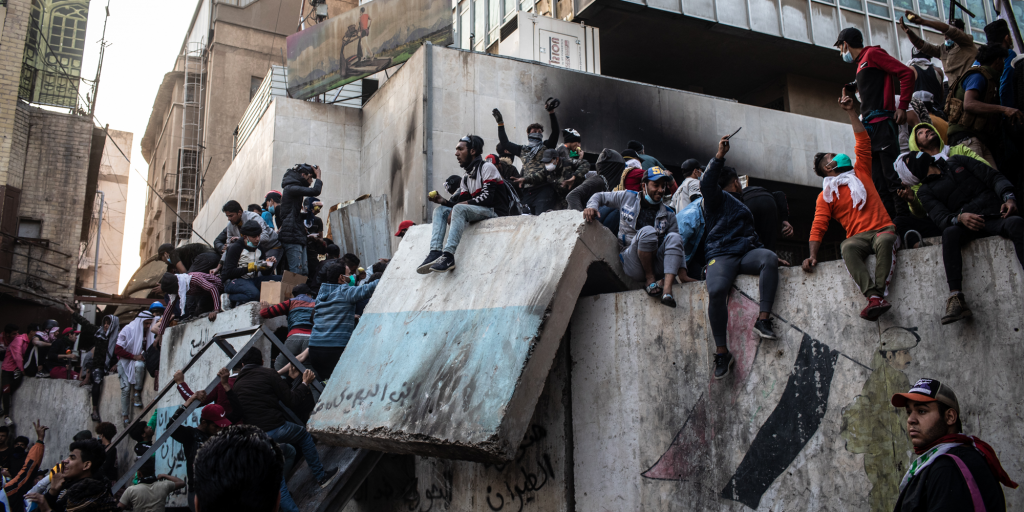
In Lebanon, a gang of warlords that agrees on little else has agreed to defend its cartel against citizens. The country’s political leaders operate like mob bosses, and have been looting the country since before the 1975–91 civil war. The population has steadily asked for basic services, rights, and dignities, and has been refused all of them, from breathable air to jobs to due process.1 They finally revolted this fall when Lebanon faced an (entirely avoidable) economic collapse, which threatens to wipe out the value of the Lebanese currency and the wealth and livelihoods of all but the most elite plutocrats. In an impoverished country living on a legalized Ponzi scheme orchestrated by the central bank and the warlord-bosses, the collapse still looms—the economy is not out of the woods. But the ruling parties have defined the peaceful protests as the greatest threat to Lebanon, blaming the victims of the crisis for the crisis that drove them to their wits’ end. The thuggish gang of bosses who run the country (in Arabic, “za’im” singular, and “zu’ama,” plural), unconcerned about their own long history of war crimes and financial pillaging, deployed violent mobs against peaceful demonstrators. They don’t want their party to end, and they apparently refuse even the slightest compromise—steal a little less, govern a little more—to revive some sort of compact between ruler and ruled. These corrupt Lebanese strongmen, like their counterparts in Iraq, don’t want to govern citizens; they want complete submission.
Lebanon’s za’im system, best translated as “boss rule,” has become a regional model. Iraq’s rulers have based their own power-sharing arraignment on Lebanon’s, with the same main precepts: parties rally people around sectarian or ethnic identity, and usually command a militia; every party gets a share of government power, so that there is no opposition; and the spoils of government feed a patronage machine that pits different identity groups against each other, in a zero-sum contest for government jobs and subsidies.
In both Lebanon and Iraq, the population has taken to the streets because it has lost any reason to believe that the government will serve even a smidgeon of the public interest. And in both cases, the government has chosen to view the people as the enemy, and its own perpetuation as its sole interest.
The specifics of each nation’s crisis and revolt are critical to assessing what might come next. But two very important trends have emerged in these most recent, and pivotal protests. The first is that the public uprisings in the Arab world are a fast-evolving learning exercise, with a great deal of adaptation evident in the Iraqi and Lebanese revolts.2 The protesters (or, by their own description, revolutionaries) have internalized the experience of the preceding decade’s uprisings. As a result, they are avoiding well-intentioned mistakes that other movements have made, such as accepting blame for the government’s abusive record, or allowing themselves to be boxed in as responsible for proposing all the solutions, or apologizing and going home when scolded for disrupting their hobbled and already profoundly disrupted countries. Nor have they been caught off guard by the government’s efforts to discredit, infiltrate, divide, and attack protests. This year’s demonstrators have planned and organized to rebound from official attacks, in the knowledge that they might have an advantage when it comes to moral legitimacy but they are at a disadvantage in terms of power and resources. Strategically, they have focused on a frontal challenge to an illegitimate and inept system of government: the government must go, and the people will demand rights, governance, and services. It’s up to the government to harness the resources at their disposal—the vast resources of the state that belong not to the warlords or parliamentarians who pilfer, but to the citizenry.
The outraged demonstrators have followed the region’s uprisings since 2010, and they have learned that authoritarians only change when they believe there’s no other path to political survival. Yet they have also learned that popular revolutions are held to unrealistic and unfair standards of nonviolence, no matter how much violence they face from the state. Unarmed civilian protesters somehow must organize an existential threat to the regime while scrupulously avoiding violence of their own. For many weeks running, the demonstrators in Iraq and Lebanon have managed this nearly impossible feat. They have maintained discipline and momentum in the face of terrifying state violence, from mobs of armed thugs to snipers and security forces shooting tear gas cannisters into people’s heads. When attacked and dispersed, they document the abuse, and regroup.
The second clear trend of the newest revolutions is that the authoritarians have abandoned any pretense of legitimacy or competence. Faced with genuine mass popular rejection, the regimes are revealing themselves as fully bankrupt and bent on self-preservation, without even a superficial nod to the greater good. The emperor doesn’t even bother to talk about clothes. Like the protest movements that study and learn from one another, the authoritarians are also studying their own role models, from Washington to Beijing. They understand that legitimacy is no longer a necessary ingredient for sustainable rule—another lesson of the last decade, during which the dictators who held onto power did so by dispensing with any semblance of care for the citizenry. The dictators who strike back early and hard are the ones with the best chance of survival—at least that’s what the region’s authoritarians seem to believe, preferring the logic of violent escalation to the logic of better governance and expanded rights. Thus, most of the popular uprisings have, so far, failed to change oppressive systems. A crowd of have-nots chanting for justice is no match for a state willing to deploy its security services and murder its own people.
Late-Bloomer Revolutions
Protests were expected over the summer in Iraq, a replay of the brief spasm of popular rage that seized Basra in the summer of 2018. Back then, crowds of mostly young men attacked symbols of the system that spurned them: political parties, militias, government offices, the Iranian consulate. It was mostly Shia men, many of them veterans of the militias that fought the Islamic State, turning against their own supposed protectors because the protectors had abandoned them. Surrounded by Iraq’s richest oil fields, Basra’s residents live in abject poverty and arrested development. The water supply of Basra was poisoned; there wasn’t enough electricity to run the air-conditioning in the hellish summer; there were no jobs; there was no hope.
In 2019, some Iraqi politicians wondered whether Basra would ignite again over the summer. But the ruling class, for the most part, misread the message. This wasn’t a Basra problem, or a Shia problem (just like earlier rounds of neglect and protest weren’t Sunni or tribal problems). All Iraqis, young and old, of every discernable description, suffered from shocking abuse by the government. They weren’t merely neglected. In many cases, they were unable to live because of the depraved rule of the country’s warlords. Basra didn’t blow up over the summer, in part because heavy rains in Turkey had temporarily replenished Iraq’s rivers and staved off another water crisis downstream. In Baghdad, prime minister Adil Abdul-Mahdi and his cabinet thought they had passed the test after a single year in power. Having drawn the wrong conclusions from their reprieve, they moved ahead with a maximalist agenda that ignored every single public interest in better services, governance, or rights. Slights and injuries piled up. Abdul-Mahdi fired Lieutenant General Abdel-Wahab al-Saadi, a popular officer in the Counter Terrorism Service, a man who symbolized patriotism and the national interest rather than partisan corruption. Saadi’s firing did not, however, spark the uprising on its own. The government could have easily found a way to sideline the officer without major backlash. But as unaccountable authoritarians often do, the Iraqi leadership, carried away with a sense of impunity, wanted to make a power move. The government refused to tolerate even the slightest protest, and even seemed to embrace the opportunity for a confrontation. When a contained demonstration of solidarity with the sidelined general rose up, the state responded with needless violence. It was this crackdown that unleashed the wave of popular rage that has been deepening ever since.
All Iraqis, young and old, of every discernable description, suffered from shocking abuse by the government.
None of the Arab dictators have properly understood that their citizens are justifiably enraged because they’re being governed abusively. Citizens (and in Lebanon’s case, the one-third or so of the population who are not citizens) are denied the most minimal of rights and services. Their governments—some but not all of them adequately resourced—have chosen a predatory, extractive form of rule. One could boil down the problem to this: the Arab region’s authoritarians have opted, literally, to steal everything they can from the state. In response, citizens have sought, through every avenue available to them, to demand, if good governance is impossible, at least surrender some share of the spoils to the public. The governments have refused, and have shown that they are willing to go to any lengths, including mass violence against peaceful protesters, to defend their cabal. The rulers appear to believe their own conspiracy theories, which makes them all the more dangerous. The most fire-breathing Iranian-allied militia leaders in Iraq, like Qais Khazali and Abu Mahdi al-Muhandis, seem genuinely convinced that the millions of enraged Iraqis demanding that Iran get out are not Iraqi patriots but stooges in a Zionist plot.3
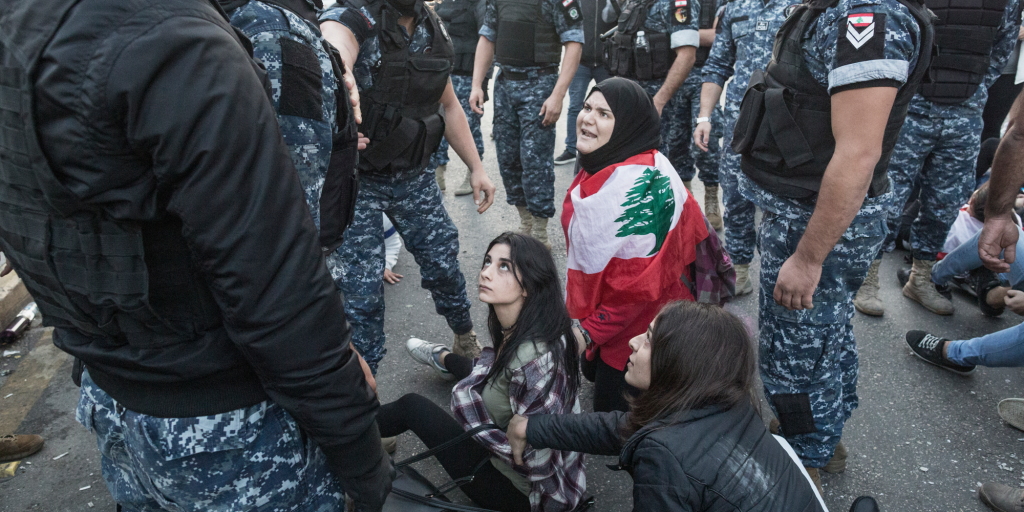
In Lebanon, the most cunning and powerful ruling parties also seem to have lost their footing now that the people’s anger has turned on them. Hezbollah’s once-nimble leader Hassan Nasrallah clumsily painted the demonstrators as saboteurs and the corrupt zu’ama bosses as the only plausible hope for reform. Nasrallah seemed unable to comprehend Hezbollah’s reversal of status—once an outsider that clamored for integrity in Lebanon’s rule, the group is now part of the government and a mainstream political player. Ruling the status quo from inside the apparatus of the state, Hezbollah can never again drape itself in the innocent outsider’s mantle. It might be powerful, and its resistance against Israel might still command respect, but that is no longer enough to insulate itself from accountability for all its errors and crimes. Hezbollah might not be the worst of the lot from the perspective of Lebanese, but it is now decidedly among the tainted gallery of guilty rulers. “All of them means all of them, and Nasrallah is one of them,” protesters chanted this fall. None of the predators are spared; they must adapt and change, become part of the solution, or else shoulder the rage of the dispossessed that they once claimed to champion.
At heart, that is what is at stake: criminal misrule and self-dealing by a tiny clique of authoritarian rulers, and a population that has been pushed to its breaking point—pushed so far, in fact, that ordinary people are willing to die to exercise the right to hoist a sign at a march.
Despite the many differences in context, all the Arab uprisings since 2010 draw elements from a general template. A ruling clique has enraged the public by brazenly raiding the state’s coffers and sabotaging the public good. This clique has refused to modulate its behavior even slightly. It has foreclosed every single effort by the public to change or reform the system. It resorts quickly to violence when a challenge gains momentum. The systems in Iraq and Lebanon are also unique in the region, and similar to each other: every single government is a power-sharing arrangement that includes every major faction. No one is left out; everyone gets a slice of state power and patronage. That means that no organized political movement or militia (often they are one and the same) can ever truly be considered “opposition.” It also means that the squabbling warlords and militias and mafia bosses that make up the government can be counted on to unify, more or less, when they face an external challenge to their corrupt feeding frenzy—challenges that have taken the form of citizens’ movements, fringe electoral campaigns, critical journalism, civil society monitoring, and protest. The long list of casualties testifies to the system’s zeal at turning away such challenges with force. Writers and social media influencers have been assassinated, imprisoned, or blackmailed by state security forces. Effective civic organizations lose funding, staff, and room for maneuver under government pressure. Elections are rigged, districts gerrymandered. Ruling parties threaten civil war if good-governance movements defeat them at the ballot box. Protests are shut down with a mix of propaganda, slander, tear gas, violent thugs, and snipers. Regimes threaten that they will sooner burn their own countries than reform. (Supporters of Syria’s President, Bashar al-Assad, literally made this threat their slogan: “Assad, or we burn the country.”) The fact that other Arab regimes appear all too willing to carry out this threat, however, does not give them any legitimacy.
An Epochal Struggle and a Distracted World
The massive protests in Lebanon in Iraq have attracted relatively little attention in policy circles and public opinion in Europe and the United States, which are close partners and supporters of the governments in Iraq and Lebanon. Perhaps this neglect is due to the distractions provided by a relentless stream of local crises (Trump, Brexit, European right-wingers). Whatever the cause of the lack of attention, many Westerners are befuddled by the protests in these two countries that, for different reasons, sat out the Arab spring. Lebanon and Iraq are both politically pluralistic societies that manage to have close ties with a competing array of foreign powers (Iran and the United States and Saudi Arabia and Qatar and Syria ). The comparative freedom and openness of these societies might conceivably make them more amenable to reform—and, it seems, has made it harder for foreign patrons to figure out how and when to take a stand against corruption and abuse of power. As a result, and frustratingly, foreign governments have not used their resources to support reform. Nor have they used their leverage to punish those who abuse power. There have been some mealymouthed and vague condemnations of state violence and recalcitrance, but none of the influential foreign governments seem to want to risk their access, or in a replay of the wave of Arab uprisings that began in 2010, overstep events and end up afoul of the winner.
What the United States and European Union can and should do is keep their distance from nationalist protesters but voice clear solidarity with their demands for reform. They can continue the civilian aspects of their relationships with Iraq and Lebanon, and use private and public channels to encourage a peaceful response to demonstrations. Western governments cannot restrain Hezbollah or Iraq’s militias, but they can end any complicity with violent repression, and they can support any security or other government agencies that are behaving with integrity. The uprisings are not a story about the West, but governments in Europe and the United States can play a useful role. They can withhold support for violence against demonstrators. They can provide political support, and money, for whatever fledgling good initiatives the governments are finally forced to organize at the behest of their beleaguered citizens. And they can talk about these revolts correctly, as part of a global struggle for rights and good governance, rather than misleadingly considering them as an Arab or Middle Eastern matter.
As small as it is, Lebanon has long been a model, test lab, and trend setter in its region, usually for the worse. Any clear-eyed and honest observer of Lebanon knows who is responsible for the state of perpetual crisis that has consistently eroded quality of life across every conceivable measure for twenty years: a band of thuggish warlords and movements that have raided the spoils of the Lebanese state in an unseemly scrum, like hyenas feasting around a corpse. They never act in concert for the national good unless they face a common and immediate outside threat, like war, street fighting, or terrorist attacks. On the other hand, when there is even a minimal internal threat to their hegemony—popular discontent, or even something as benign as a likable group of intellectuals who organize an independent slate of candidates for city council—they are quick to work together to snuff it out.4 Any move toward accountability poses an existential threat to a parasitic government.
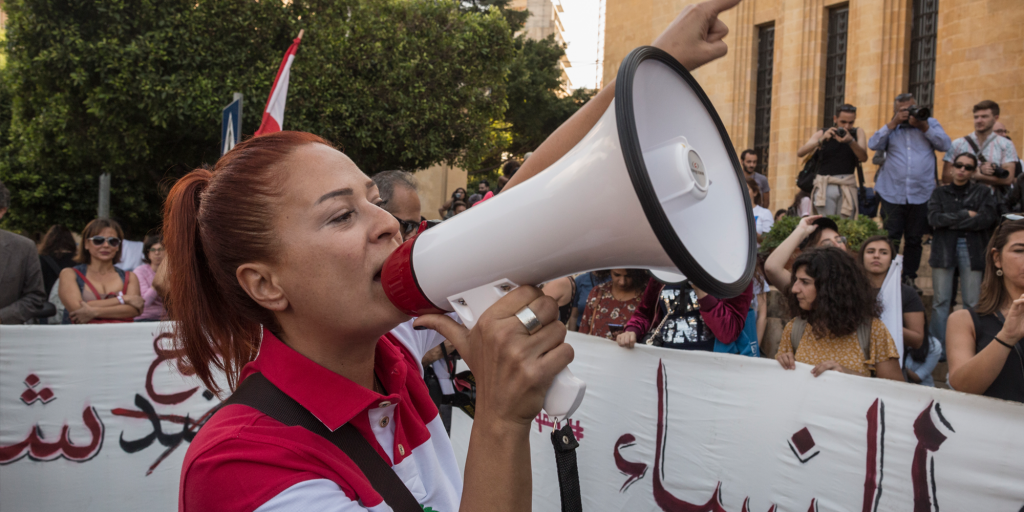
Just as the Lebanese power-sharing formula has inspired rapacious state builders elsewhere, so too can the dynamism and innovation buzzing through the region’s protest movements. The population of the region—citizens, refugees, and migrants alike—are the primary resource being exploited by the state. If they resist in unison, the state cannot function, and its wardens cannot profit. Since the first uprising in Tunisia began in 2010, we’ve seen growing complexity in the revolts. The recent revolutions in Sudan and Algeria have yet to fully bear fruit, but the protesters in both cases knew not to trust the military as an ally for change, and understood that in order to succeed, protests had to be sustained and massive—and, sadly, that protesters had to be willing to die.
How might the protests in Iraq and Lebanon lead to change? And what does change look like in countries so criminally misgoverned that even the slightest improvement existentially threatens the violent powers underlying the status quo?
Hope might seem a misguided response to so many cycles of inspiring revolt followed by crushing state reaction. But the practices of liberty, even if they are mostly symbolic in the face of overwhelming repression, are important symbols, and more than that. What the demonstrators in Iraq and Lebanon are doing is, quite simply, the right thing to do. They give lie to the state’s claim that the governed will accept any and all mistreatment. By organizing, demanding, and acting, they are changing their own relationship to power, even when they fall short of changing power itself. Political protest against an authoritarian system or dictatorship is an act of faith. It is also an instrumental act; people do it not just to create a symbol, but because they hope it might work. History tells us that sometimes, it does. Political change is possible, and political change requires forcing the violent machinery of the state to cease its violence and serve the citizenry.
To be sure, in an authoritarian state, change requires stopping the military and the police from stopping the people. Mass politics, including protest, is one crucial measure—not sufficient in of itself, but surely a powerful and requisite force—for stopping up the state’s capacity to violate and silence its citizens. The latest Arab uprisings are a bracing reminder: any state that utterly fails at the basics of governance can expect a popular challenge.
How to Transform a Brittle System?
We’ve learned a lot since the first uprisings swept the region some nine years ago. Authoritarians are resilient, and they can extend their time in power if they are willing to kill indiscriminately and mobilize state resources to impose unprecedented levels of repression. We also know that popular protests don’t, alone, spell the end of tyranny and the dawn of democracy. On the other hand, there is research that suggests that massive nonviolent protest is the single most successful path to topple repressive regimes—historically, nonviolent protests are a far better bet than armed rebellions.5 The political scientist Erica Chenoweth has studied every “people power” movement in modern times, and says the data gives reason for optimism. If a nonviolent protest mobilizes more than 3.5 percent of the population of a state, Chenoweth has found, some type of political transformation always follows.6 Anecdotally, protesters see the evidence of their power all around, even in revolutions that stalled, like Egypt’s. The last time so much of Lebanon mobilized in public protest, in 2005, mighty Syria was forced to end its fifteen-year military occupation of Lebanon.
Over the past decade in the Arab region, we’ve also learned that no level of authoritarianism suffices to keep people silent in the face of ongoing humiliation and misgovernance. If people cannot live, they will revolt. Some authoritarian systems repress with one hand but provide the benefits of statehood with the other—so citizens of China might suffer attacks on political and civic rights, but they might weigh those infringements against the security, services, and economic opportunities provided them by the state.
The Arab despots have not followed even this distasteful formula. They repress and they also plunder. There is no tradeoff. There are no rights, and there is also no opportunity. There is no unifying ideology or sense of belonging, and there are also no services.7 There are no rights and personal dignity—and at the same time, there is no protection from existential threats like the Islamic State. Some rulers have relied on a sectarian or ethnic overlay to distract their publics from state misconduct, but the current manifestation of sectarian identity politics is historically recent and already appears to be waning. Abusive authoritarians will continue the same kind of misrule, with or without sectarian framing, as Iraq’s government has demonstrated.
Only with difficulty does the inchoate reform and accountability agenda of an outraged populace translate into a political process. Sudan’s uprising illustrates one tentative outcome, in which a transition council includes elements of the old order along with representatives of a revolution, and offers at least the prospect for a transition. But an almost fetishistic aversion to leaders and to politics still percolates through the uprisings in Lebanon and Iraq, and if it continues, will likely limit their ability to steer any changes to the system.8 In history, successful revolutions often resembled coups—revolutionaries taking not only the streets but taking over the official media, the military barracks, and other organs of state. Today’s Arab revolts are self-consciously nonviolent and avowedly not in the mold of violent revolutions from times past; these people’s protests don’t want to take over the state, only to hold it accountable and force it to reform. Such limited demands and organization might not suffice to dislodge predatory ruling systems.
Is popular outrage enough to transform a venal system, bent on preserving its privileges? Perhaps not, but it is a crucial ingredient of revolution, reform, or any meaningful change. It is also the only opening that remains, since the rulers have so assiduously used the machinery of state to crush any effort to reform the system from within through electoral politics or well-meaning administrative campaigns.
Massive street protests signal a populace that is fed up. Massive protests also make a country ungovernable. There is real leverage when the public tells the rapacious ruling class that it can no longer control the country, leech its resources, and make money. It’s not up to the mass movement to craft a blueprint for governance. But in both Lebanon and Iraq, the blueprint to a better life is well known to the ruling class. They don’t know how to solve all the problems, but they do know how to fix the most pressing crises of inequality, broken services, and lack of rights. They know how to issue passports and make arrests without soliciting bribes. They know how to build power plants and manage electricity grids. They know how to staff hospitals. They know how to administer an election with secret ballots, all of which are properly counted. None of this is rocket science. Much of it has been done in these very countries, in the living memory of their citizens. This isn’t a black box, a mystery to solve. It’s simply a question of whether an untouchable elite can be forced to give up its lavish and inequitable perks.
Header Photo: A young Iraqi protestor launches rocks at Iraqi security forces with his slingshot near Al-Senak Bridge in Baghdad on Nov. 15, 2019. Source: Erin Trieb/Getty Images
Notes
- “Lebanese Government: A Dismal Performance,” Government Monitor No. 7, Lebanese Center for Policy Studies, November 15, 2019, https://www.lcps-lebanon.org/agendaArticle.php?id=111.
- Hashem Osseiran (in Beirut) and Maya Gebeily (in Baghdad), “‘Sister Protests’: Lebanon, Iraq Look to Each Other,” Agence France-Presse, November 11, 2019, https://news.yahoo.com/sister-protests-lebanon-iraq-look-other-161503911.html.
- Abu Mahdi al-Muhandis, often known as Abu Mahdi, is a nom de guerre; his real name is Jamal Jafaar Mohammed Ali Ebrahimi.
- See Mona Fawaz, “Beirut Medinati and the Prospects of Urban Citizenship,” The Century Foundation, April 16, 2019, https://tcf.org/content/report/beirut-madinati-prospects-urban-citizenship/.
- David Robson, “The ‘3.5% rule’: How a small minority can change the world,” BBC, May 13, 2019, https://www.bbc.com/future/article/20190513-it-only-takes-35-of-people-to-change-the-world.
- Erica Chenoweth, “The Success of Nonviolent Civil Resistance,” International Center for Nonviolent Conflict, November 2013, https://www.nonviolent-conflict.org/resource/success-nonviolent-civil-resistance/.
- The title of Alan George’s 2003 book, Syria: Neither Bread nor Freedom (London: Zed Books) succinctly summarizes this bitter formula for authoritarian domination.
- Erica Chenoweth et al, “This may be the largest wave of nonviolent mass movements in world history. What comes next?” Monkey Cage, The Washington Post, November 16, 2019, https://www.washingtonpost.com/politics/2019/11/16/this-may-be-largest-wave-nonviolent-mass-movements-world-history-what-comes-next/?wpisrc=nl_cage&wpmm=1.
